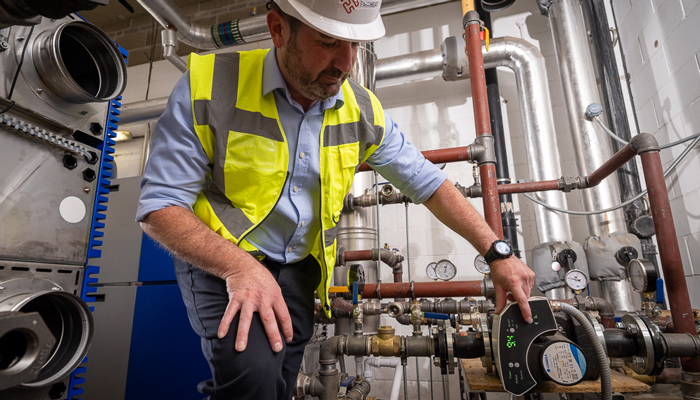More training will be crucial to heat network expansion

The industry will have to ramp up targeted training to keep up with demand for new heat networks and increasing technical scrutiny, according to the Building Engineering Services Association (BESA).
Heat networks will become subject to full regulation by the energy watchdog Ofgem next year placing greater emphasis on technical standards and consumer protection. The government has also selected six UK regions to be hosts of heat network ‘zones’ which will share a £5.8 million funding pot to help further develop the industry.
Leeds, Plymouth, Bristol, Stockport, Sheffield, and two areas in London will use the funding to identify the best locations for new networks through data analytics. They will also become showcases for installing networks at scale and demonstrating the use of recycled heat to serve multiple buildings.
While welcoming this support for a technology seen as crucial to decarbonising UK heat, BESA warned that this would put further pressure on the sector’s workforce and called for more investment in training.
The Association has also accredited two new fully funded heat networks courses: A short online foundation course, which has been updated and improved to further increase understanding of the sector, and a more in-depth installation and maintenance course to help meet rising demand for skilled professionals.
Partnership
The new courses are the next stage in BESA’s industry-wide training scheme for heat network engineers launched at the start of this year. It is backed by government funding and was developed in partnership with the Manufacturers of Equipment for Heat Networks Association (MEHNA) and the Thermal Insulation Contractors’ Association (TICA).
The Heat Networks Foundation Course covers design, operation and management of heat networks, providing the trainee with an overall awareness. It is aimed at people already working in the building services industry, either technical or non-technical, who are interested in improving their understanding of the technology.
This introductory course covers basic principles and key components of a heat network including diversified loads, heat interface units (HIUs), water treatment and the basics of thermal insulation for secondary systems.
Heat Networks 1 Installation and Maintenance Course is a more comprehensive blend of online theory and hands-on practical training and is designed to meet the rising demand for skilled professionals in heat network systems.
Developed in partnership with heat network experts, this course will help engineers upskill and gain cutting-edge knowledge and skills. As well as allowing them to diversify their careers into this high potential area, these trained engineers can also help to address some of the quality issues affecting existing heat networks.
Up to a third of installed systems serving homes and large non-domestic buildings such as hospitals, universities, hotels, supermarkets, and office blocks are thought to be in urgent need of upgrading. Many were not designed properly and so do not meet current efficiency standards.
There are also plans for a quality assurance framework to improve reliability and guarantee levels of performance – all of which will increase demand for a larger workforce of well-trained heat network engineers.
Just 2% of the country’s heat is currently distributed by networks, also known as district heating or district energy systems, but the government aims to grow that to 18% by 2050 in line with its wider net zero commitments.
“This is a great opportunity for anyone considering diversifying into heat networks,” said BESA’s Director of Competence and Compliance Helen Yeulet. “This technology will play an increasingly important role in the transition to net zero, so it is vital that the country has enough trained installers who can help networks meet their full energy and cost saving potential.
“The sector is also facing a busy period of upgrading existing networks to meet higher technical standards as well as rolling out new installations, so this is an exciting time to be entering the profession.”
As well as the training courses, BESA developed the industry’s test regime for Heat Interface Units (HIUs) to ensure the equipment used to distribute heat from networks to individual homes and commercial buildings also meets rigorous technical standards.
For more information or to register your interest go to the Heat Network Foundation Course or the Heat Network Installation and Maintenance Course sites to secure a fully funded training place.
Add your comment

- Catering 1
- Construction 39
- Contracts, Projects, Bids 19
- Energy Management 103
- Engineering, Maintenance 623
- Estates, Property 36
- Events 1
- Facilities Management (main) 278
- Front of House 1
- Hard Services 54
- Health & Safety 1
- HVAC 218
- Management 2
- M&E 224
- Operations 81
- Procurement 19
- Sales & Marketing 4
- Soft Services 3
- Sustainability 1


